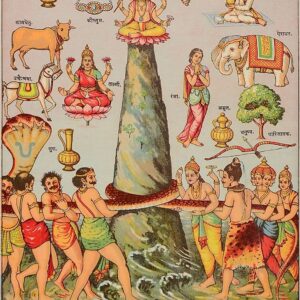A damaru (Sanskrit: डमरु, IAST: ḍamaru; Tibetan ཌ་མ་རུ་ or རྔ་ཆུང) is a small two-headed drum, used in Hinduism and Tibetan Buddhism. In Hinduism, the damaru is known as the instrument of the deity Shiva, associated with Tantric traditions. It is said to be created by Shiva to produce spiritual sounds by which the whole universe has been created and regulated. In Tibetan Buddhism, the damaru is used as an instrument in meditation practices.
Description
The drum is typically made of wood, metal with leather drum heads at both ends. The resonator is made of brass. The height of the damaru is 6 inches and weight varies from 250 to 330 gm. Its height ranges from a few inches to a little over one foot. It is played single-handedly. The strikers are typically beads fastened to the ends of leather cords around the waist of the damaru. Knots in the leather can also be used as strikers; crocheted material is also common. As the player waves the drum using a twisting wrist motion, the strikers beat on the drumhead.
In Hinduism
The damaru is very common throughout the Indian subcontinent. The damaru is known as a power drum, and when played, it is believed to generate spiritual energy. It is associated with the Hindu deity Shiva. It is believed that Sanskrit language was recognized by the drumbeats of the damaru (see Shiva Sutra for the sounds), and his performance of the cosmic dance of tandava. The damaru is used by itinerant musicians of all stripes, due to its small portable size.
In the shield shape of some damarus, the triangular upward representation also symbolizes male procreativity (the lingam), and the downward round representation symbolizes the female procreativity (the yoni). Symbolically, the creation of the world begins when the lingam and yoni meet at the midpoint of the damaru, and the destruction takes place when they separate from each other.

















Reviews
There are no reviews yet